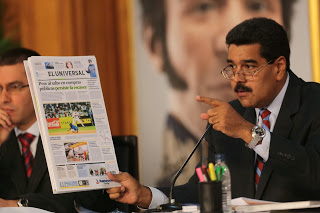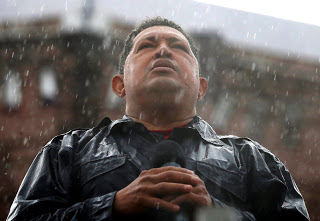During the past few months, the Venezuelan
government led by President Nicolas Maduro has denounced multiple incidents of
sabotage against the country’s electrical infrastructure along with an ongoing
campaign to undermine the nation’s economy. A majority of international media,
together with private media in Venezuela, have ridiculed the Venezuelan
President’s accusations, and have instead attempted to pin responsibility on
the government for the instability and harm caused to the country by these
actions. Nevertheless, an internal document authored by three organizations
from Colombia and the United States, evidences a sinister plan against the
Venezuelan state to provoke violence - even death - with the intention of
justifying an international intervention in anticipation of municipal elections
scheduled for next December 8.
The document, titled “Strategic Venezuelan
Plan”, was prepared by the Democratic Internationalism Foundation (http://fidauv.org), headed by ex Colombian president Alvaro
Uribe, together with the First Colombia Think Tank (http://www.pensamientocolombia.org) and the US Consulting firm, FTI Consulting (http://www.fticonsulting.com). Dated June 13, 2013, the plan was developed
during a meeting between representatives from these three organizations,
leaders of the Venezuelan opposicion, including Maria Corina Machado, Julio
Borges and Ramon Guillermo Avelado, expert in psychological operations J.J.
Rendon and the Director of the US Agency for International Development (USAID)
for Latin America, Mark Feierstein.
The strategic plan to destabilize Venezuela has
the primary goal of debilitating the government before the December 8 municipal
elections, as revealed in the document: “The objectives put forth in the
present plan are essentially geared towards the municipal elections set for
December 8, while at the same time including the accelerated deterioration of
the government, facilitating an opposition victory for this event...” Though
the text states further, “...but if it could be done beforehand, that would be
even better”.
The document also details the strategy to
sabotage the electrical system in Venezuela, with the objective of blaming the
government for a weak infrastructure and therefore projecting an image of
crisis in Venezuela on an international level. As part of the plan, the authors
propose, “To maintain and increase the sabotages that affect public services,
particularly the electrical system, that will enable responsibility to be
placed on the government for supposed inefficiencies and negligence”. For the
past few months, blackouts and other electrical shortages have affected
different regions throughout Venezuela, causing general discontent and
reflecting negatively on the government. Just weeks ago, Venezuelan authorities
detained various individuals involved in sabotaging the electrical system and
at the end of September, President Maduro expelled three US diplomats from the
US Embassy in Caracas for their alleged role in destabilization plans against
the state.
In the section labeled “Actions”, the authors
of the document detail their next steps to undermine the Venezuelan government.
In addition to “Perfecting the confrontational discourse of Henrique Capriles”,
the opposition candidate who lost to Maduro in April’s presidential elections,
they also talk of “Generating emotion with short messages that reach the
largest quantity of people and emphasize social problems, provoking social
discontent. Increase problems with supply of basic consumer products”.
Throughout the year, Venezuela has experienced
problems with the supply of basic products, such as toilet paper, sugar, milk,
oil, butter, flour and other food staples. Venezuelan authorities have
confiscated tons of these products illegally held inside warehouses belonging
to opposition businesses. They have also captured large quantities of these
items on the border with Colombia, where they are sold as contraband.
According to the document, “The Strategic
Venezuelan Plan, agreed upon by representatives from the opposition to the
government of Nicolas Maduro, is oriented towards these objectives with the
strong and constant support of various world figures who aim to return
Venezuela to the true democracy and independence, which has been kidnapped for
more than 14 years”.
During the 14 years of President Hugo Chavez’s
democratic governance, threats against his administration were abundant and
destabilization plans never ceased. After the failure of the 2002 coup d’etat
against Chavez, which was defeated by his millions of supporters and was organized
by the US government, there were numerous attempts to oust him through economic
sabotages, electoral interventions, assassination plots, psychological warfare,
multimillion-dollar funding to opposition groups from US agencies and a plan to
isolate Venezuela on an international level, that never had success.
One of the most visible faces of attempts to subvert
Chavez’s government was ex Colombian president Alvaro Uribe. The former
Colombian head of state ended his presidency in 2010 calling for international
intervention in Venezuela in order to destroy Chavez and his Bolivarian
Revolution. Uribe has dedicated himself since then to difame Chavez and his
legacy, as well as strengthen his ties to anti-Chavez groups inside and outside
Venezuela.
The death of Preisdent Chavez in March 2013
didn’t stop Uribe from continuing his actions against Venezuela. With the
election of Nicolas Maduro to the presidency and the continuation of the
socialist process initiated by Chavez, Uribe has mantained his agressive agenda
against Venezuela.
Now this internal document, a product of a
meeting between the extreme right-wing in Colombia and Venezuela, together with
representatives from the US government, proves the active destabilization plans
against Maduro.
As part of this dangerous plot against
Venezuela, the authors propose to “Create situations of crisis in the streets
that will facilitate US intervention, as well as NATO forces, with the support
of the Colombian government. Whenever possible, the violence should result in
deaths or injuries”.
Venezuelans, representatives of the opposition,
are working together with foreign interests to generate deaths of innocent
citizens in their own country, with the objective of justifying a military
invasion in their nation. This represents a grave threat - and a vile crime -
against the sovereignty of Venezuela.
Furthermore, in addition to promoting an
international campaign to marginalize, discredit and tarnish the Maduro
government, the document recommends “a military insurrection” against the
Venezuelan state. They propose, “contacting active military groups and those in
retirement to amplify the campaign to discredit the government inside the Armed
Forces...It’s vital to prepare military forces so that during a scenario of
crisis and social conflict, they lead an insurrection against the government,
or at least support a foreign intervention or civil uprising”.
This document evidences and confirms the
veracity - and the severity - of the accusations made by President Nicolas
Maduro. Venezuela is under attack, as it has been throughout the past 14 years
since the beginning of the Bolivarian Revolution and the recovery of Venezuela’s
sovereignty, independence and dignity. Let us not forget that Venezuela has the
largest oil reserves on the planet. The powerful interests that seek control of
those resources will not stop until they attain their objective.
T/ Eva Golinger
Artículo en español con documento original aquí

